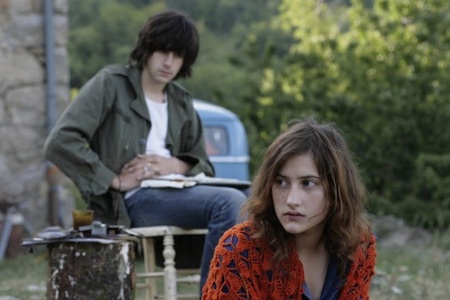“The past is a foreign country: they do things differently there.” So begins L.P.Hartley’s novel The Go-Between, memorably filmed in 1971 by Joseph Losey from a screenplay by Harold Pinter, who being no fool, kept that immemorial opening line. It sprang immediately to mind while watching Olivier Assayas’ latest film, Something in the Air (Apres Mai). It’s not that his recollection of events that took place in France in the early seventies is untrustworthy. Rather one can sense from the start a ruefulness in this backward glance. He’s not “sadder but wiser,” as he’s not sad at all now. But it’s not completely clear if he’s wiser, either.“The film opens on the February 9, 1971 demonstration that would have a strong influence on the years to come,” Assayas declares in press notes for the film. What we see on screen are helmet-wearing students wielding iron bars, facing off against far better-armed police who shut down the demonstration before it really starts.One can’t help but be reminded of May, 1968, and the demonstrations that shut down France, and nearly led to quasi-revolutionary revolt when striking workers (the lower classes) were joined by students (the middle and upper) taking on the De Gaulle regime. The status quo was restored, but the revolutionary dream remained. For May ’68 didn’t just take place in France. There were demonstrations in Italy and other countries and in the U.S. New York’s Columbia University was shut down in a demonstration said to have been inspired by La Chinoise, as Jean-Luc Godard’s 1967 film about French Maoists had just been released there.In some ways it’s hard to separate cinematic “fantasy” from political “reality” when recalling that halcyon era. Lindsay Anderson’s If. . .(1968) had no intention to make a contemporary comment, in that it unfolded in a timeless semi-surreal mise en abyme. Likewise Gillo Pontecorvo’s The Battle of Algiers (1966) was about a particular place and time yet “spoke” to those unaffected by the events it recreated. Chris Marker’s documentary compilation essay film A Grin Without A Cat (Le Fond de l’air est rouge) (1977) covered the political waterfront, copiously noting the rise of leftist terrorism that had come in the wake of May. But the films that best capture post-May malaise remain Jacques Rivette’s Out 1 (which can be seen in its entirety here via Dennis Cooper) and Jean Eustache’s The Mother and the Whore (1973) speak to the sense of very personal disillusion that became May ’68’s greatest hangover.In 2006 Bernardo Bertolucci’s The Dreamers attempted May ’68 zeitgeist through a story of an American (Michael Pitt) having a ménage a trois with some French enfants terribles (Louis Garrel and Eva Green) spending more time on the personal than the political. Yes “the personal is political” became the watch-cry of post-May. But it’s hard to know where one ends and the other begins as Philippe Garrel shows in Regular Lovers, which also starred Louis. Garrel pere was actually dans la rue in May ’68 (unlike Bertolucci or Godard); he had specific memories to draw from. But not content with mere “docudrama” reproduction, his demos feature ghosts from the French revolution in full period garb fighting the police and tossing Molotov cocktails.More tellingly, Garrel shows that many of the demonstrators weren’t as politically astute as one might imagine. They retreat in short order to a house just outside of Paris to canoodle, flirt and dance.At the film’s close we are informed—not shown—of the passing of the film’s anti-hero. Clearly Garrel is indicating his younger self has “died” figuratively, rather than literally. In Something in the Air, Assayas doesn’t go nearly so far as that. A beautifully staged scene recreating a protest at a factory where the anti-hero and his friends put up posters and spray graffiti clearly indicates political commitment. But what one carries away with one at the close is the intense longing on the face of his anti-hero (beautifully played by Clement Metayer) when he realizes the women on whom he has expended so much affection can’t quite reciprocate.Perhaps instead of “l’imagination au pouvoir,” the real May ’68 et après slogan is “cherchez la femme.”


Did you like this article?
Give it a vote for a Golden Bowtie
Give it a vote for a Golden Bowtie
0
Keyframe is always looking for contributors.
"Writer? Video Essayist? Movie Fan Extraordinaire?
SUGGESTED FOR YOU
Fandor is streaming on Amazon Prime
Love to discover new films? Browse our exceptional library of hand-picked cinema on the Fandor Amazon Prime Channel.


